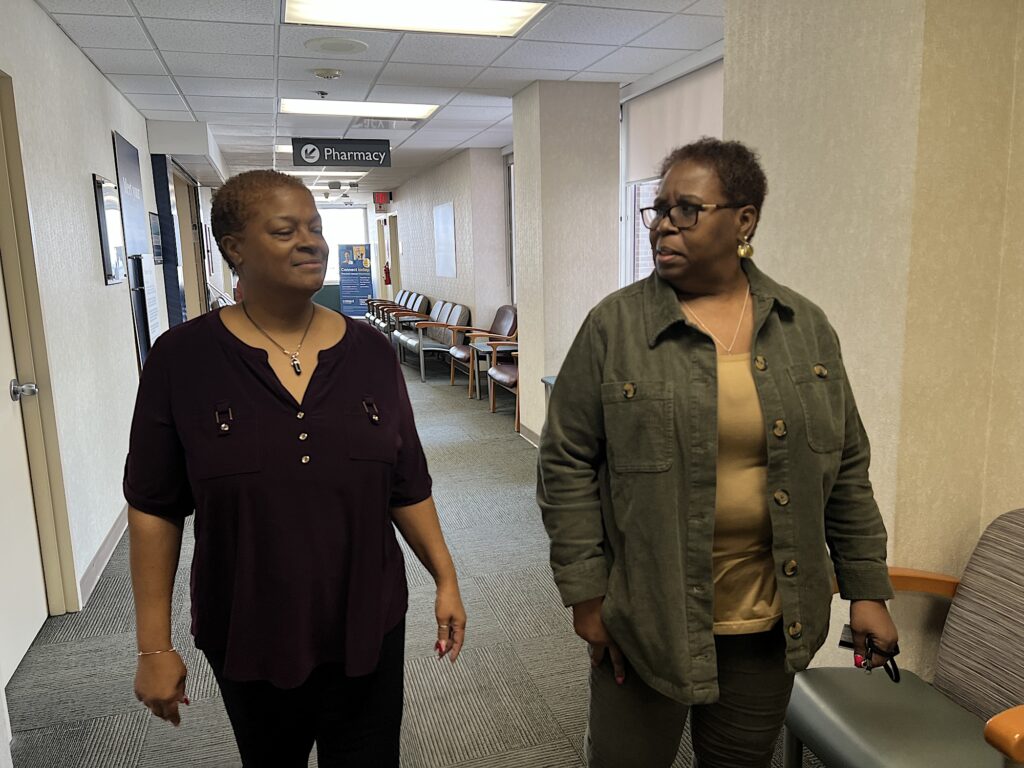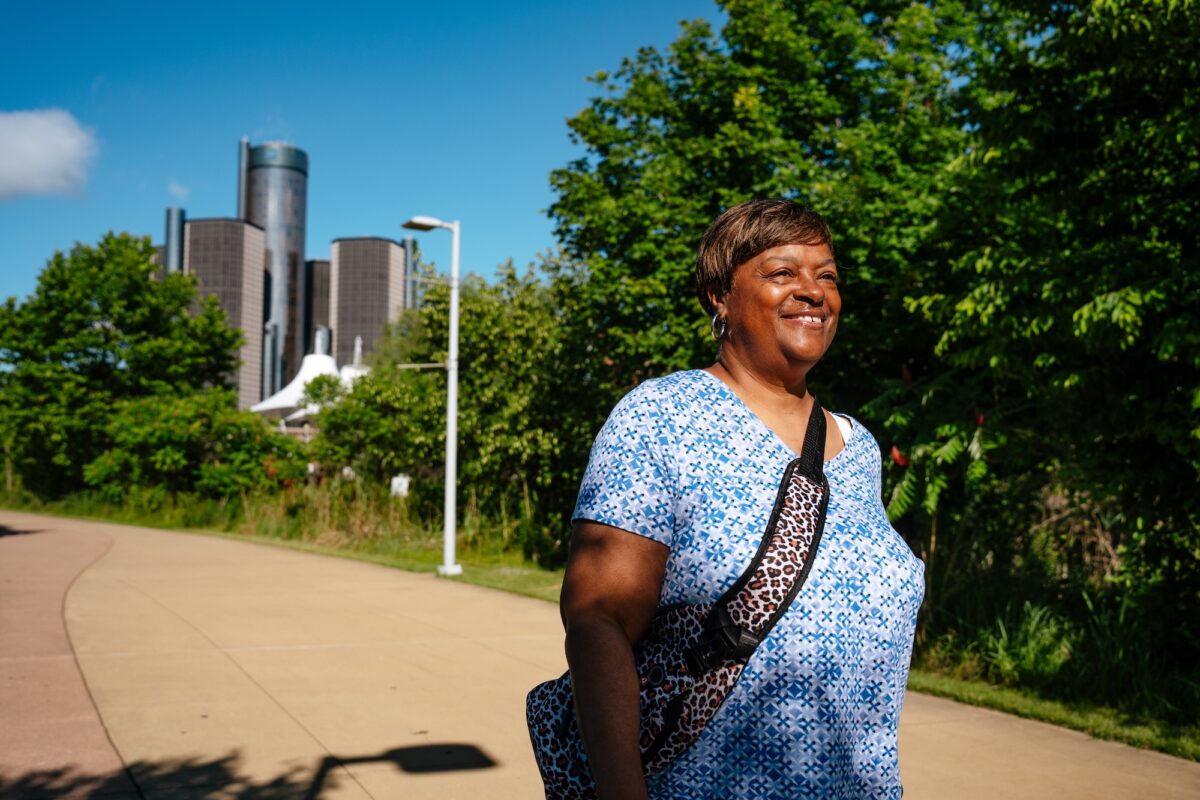Overview:
- Community health workers at Henry Ford Health in Detroit are transforming diabetes care, offering vital support through weekly check-ins, guidance, and encouragement.
- As physicians face limitations in addressing chronic conditions, CHWs bridge the gap, helping patients lower their A1C more effectively.
- Launched as a pilot in 2014, the program's success has secured ongoing funding, highlighting the essential role of CHWs in patient care.
Underwritten by:

Read our entire series on Community Health Workers here>>>
When Terry Pita’s doctor told her she needed to start insulin, she burst into tears. “I just didn’t want to take shots,” she said. “I still cringe.”
Pita, who has managed Type 2 diabetes for more than a decade, had struggled for years to bring her A1C, a measure of long-term blood sugar control, down to a healthy range. Her numbers hovered in the double digits. Then her doctor referred her to Linda Johnson, a community health worker at Henry Ford Health.
Johnson didn’t prescribe medication or perform procedures. Instead, she called Pita once a week, walking her through grocery choices, reading nutrition labels together over the phone, and encouraging small changes. “She said, ‘You don’t have to stop what you like eating. Just don’t eat so much of it,” Pita recalled.
Over time, Pita’s numbers began to drop. She started walking again — 10 miles a day at her peak — and gradually cut her insulin dose from 28 units to 10. Today, her A1C is 5.7, just below the threshold for pre-diabetes. For Pita, that number represents not just better blood sugar control, but a major step toward reducing her long-term risk of complications like heart disease, nerve damage, and kidney problems. “I feel very comfortable with what I’m doing now,” she said.

How CHWs support diabetes care at Henry Ford
At Henry Ford Health’s internal medicine clinic, community health workers are more than just helpful extras. They’re an essential link in the care team. For patients like Pita, that support comes in the form of weekly check-ins, guidance through everyday challenges, and consistent encouragement. For the clinic’s physicians, it means bridging a critical gap in the system.
“Our residents are in clinic for a few weeks at a time, and then they’re back on the hospital floors,” said Dr. Anupama Nair, a Henry Ford internal medicine physician who helps oversee the program. “There’s a possibility for loss of continuity — something gets started, but it doesn’t always get closed. Community health workers help us follow through.”
Nair said the model emerged from a growing recognition that physicians alone can’t meet every patient’s need, especially for those managing complex chronic conditions like diabetes.
“Physicians have certain expertise,” she said. “But we’re not always the best — or have the time — to provide certain types of education. Community health workers are able to engage patients in ways we can’t.”
Henry Ford’s CHW diabetes program began as a pilot in 2014 and was funded through a hospital foundation grant. Johnson initially focused on supporting insulin titration: gathering blood sugar readings and relaying them to nurses authorized to adjust dosages. Over time, her work expanded to include health coaching, nutrition education, support for patients using continuous glucose monitors, and follow-up with high-risk patients who’ve missed appointments.
Nair credits the program with measurable results. “We wrote a paper on it. t showed that patients who participated with the community health worker were able to lower their A1C better than those who didn’t,” she said. That early success helped secure ongoing institutional support, and the program is now fully funded by Henry Ford Health.
Scaling a model: Building a systemwide CHW infrastructure
Linda Johnson is just one of nearly two dozen community health workers employed across Henry Ford Health. Behind her work is a larger infrastructure designed to embed CHWs throughout the health system, supporting patients in oncology, primary care, women’s health, chronic pain, and more.
“We created the CHW hub about eight years ago because we were seeing tremendous success,” said Jaye Clement, vice president of community health programs and strategies. “We were getting more requests to apply that same kind of community-based model to dynamic issues that weren’t clinical in origin, but had clinical impact.”
The CHW hub operates as a centralized support and training structure. A certified CHW trainer manages the program and deploys workers based on clinical needs, funding sources, and outcome goals. The program has supported as many as 25 CHWs at once across 10 departments or programs.
Clement said each potential placement undergoes an internal vetting process to ensure CHWs are assigned where they can make the most impact. “We’ve told some groups, ‘This doesn’t need a CHW — you probably need a research assistant or a clerk,’” she said. “But if it’s about addressing barriers to care, that’s when we know we’re in the right place.”
All CHWs go through core competency training, with additional support for role-specific knowledge. Many are from the communities they serve, and the hub prioritizes hiring people with lived experience.
CHWs may work by phone or in person, and are encouraged to build relationships not just with patients, but also with local service providers. “We know we can’t meet every need internally,” Clement said. “That frontline-to-frontline connection is where the real value happens.”
The funding puzzle: Reimbursement, recognition, and retention
While Michigan’s new Medicaid policy allows for reimbursement of CHW services, the infrastructure to support that billing is still being built. But with sweeping federal Medicaid cuts now signed into law, future support for CHW reimbursement could be at risk, raising new concerns about sustainability, especially for community-based programs.
“Now that we have some level of reimbursement, we’re working on putting the billing systems in place,” Clement said. “But we know the reimbursement isn’t sufficient to cover all their time — because you’re not reimbursed for everything CHWs do.”
That’s part of why many CHW positions are still funded through grants, internal budgets, or shared resources across departments. “You don’t have a cost center for ‘building trust,’” Clemente said. “When you don’t build the budget from the ground up with a CHW in it, they’re invisible.”
Most CHWs at Henry Ford are full-time employees with benefits, but wages vary. According to the Michigan Community Health Worker Alliance’s 2024 Employer Report, CHW pay in Michigan ranges from $14 to $38 per hour, with an average of $21.37.
Henry Ford faced retention challenges due to pay disparities, Clement said. She notes one CHW, Clarence, who left Henry Ford for a job in construction because it paid more. He later returned. “And in that time while he was gone, we got the position regraded—and he came right back.”
For now, the diabetes program at Henry Ford’s internal medicine clinic is funded entirely through the institution. Physician Nair said the clinic has continued to support the role because of its demonstrated impact. “We can show that these programs work,” she said. “But we still don’t have direct financial support for them.”
Advocates like the Michigan Community Health Worker Alliance have warned that the new federal cuts — estimated to slash billions from Medicaid — may hinder state-level efforts to expand CHW reimbursement and infrastructure.
A relationship that changes lives
For Pita, the weekly phone calls with Johnson were never just about blood sugar readings or meal plans. They were an emotional anchor that helped her take charge of her health.
“She makes you feel comfortable about talking about everything,” Pita said. “We’d get to talking about my garden, and it just rolled into everything I was doing with my health.”
Pita’s A1C is under control, her insulin dose is down, and she’s back to walking miles every day. She was officially “dismissed” from the program after hitting her health goals — again. But she plans to keep in touch.
“She got me back on track,” Pita said. “I’ll still drop off some vegetables from my garden in the summer.”
This reporting series from Planet Detroit examines the growing role of community health workers (CHWs) in Michigan—trusted professionals who assist residents in navigating housing, food access, managing chronic illnesses, and the healthcare system. Medicaid cuts could undermine funding for these workers, who often come from the same communities they serve. By building trust and drawing on lived experience, CHWs are addressing critical gaps in care that traditional health systems often overlook. This project was made possible with support from the Michigan Health Endowment Fund.


